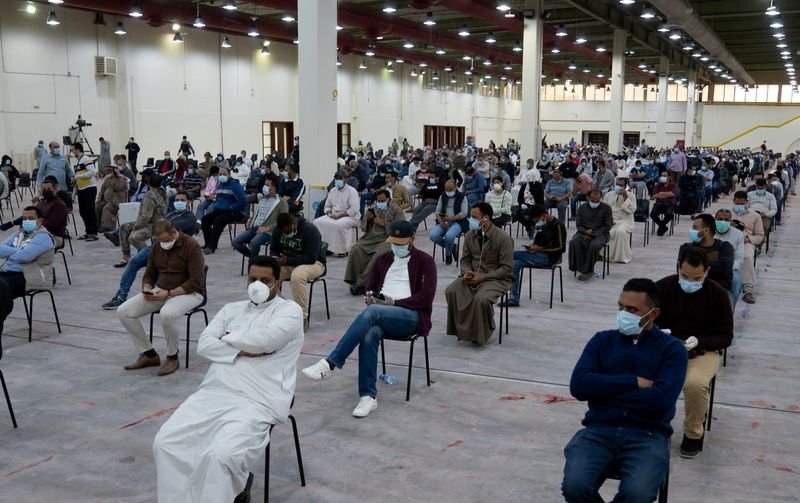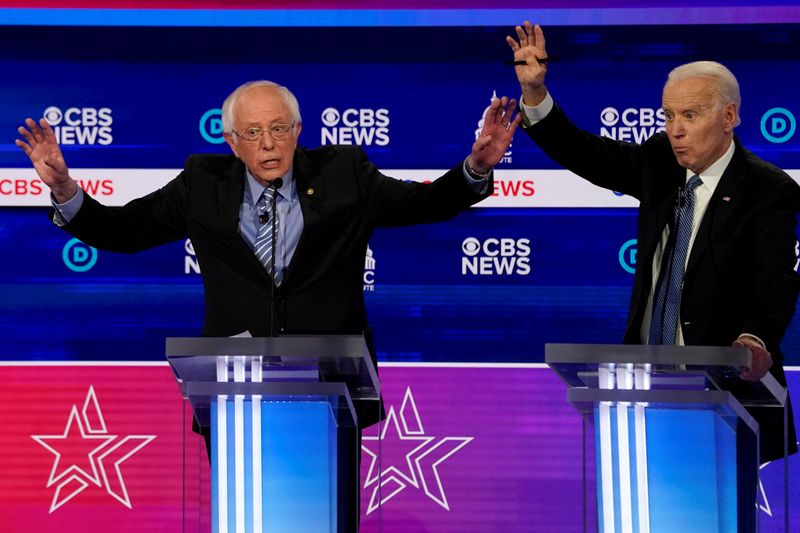
FILE PHOTO: Expatriates wait for mandatory coronavirus testing in a makeshift testing centre in Mishref, Kuwait March 14, 2020.REUTERS/Stephanie McGehee
March 15, 2020
By Stephen Kalin and Alaa Swilam
RIYADH/DUBAI (Reuters) – Saudi Arabia closed malls, restaurants, cafes and public parks on Sunday and other Gulf Arab states expanded measures to contain the coronavirus as infections spread across the region.
The United Arab Emirates, Oman and Qatar reported new cases, raising the total number in the six-member Gulf Cooperation Council (GCC) to 948, with no deaths reported.
The UAE recorded 12 more travel-linked infections among various nationalities — South African, Australian, Chinese, Filipino, Italian, Lebanese, British, Iranian, Emirati and three Indians — raising the country’s total to 98.
Qatar’s health ministry announced 64 new cases, Doha-based Al Jazeera TV reported and a Qatari official confirmed, saying they were quarantined. Oman reported two more infections, including a national who had visited Italy.
In Saudi Arabia, local municipalities tweeted directives for the closure of malls, restaurants, coffee shops and public parks, while exempting supermarkets, pharmacies and food delivery. Al Arabiya TV said the measures would apply across the country, where 103 infections have been diagnosed.
The justice ministry postponed all non-urgent judicial hearings indefinitely.
Regional tourism and business hub Dubai joined the UAE capital Abu Dhabi in closing cinemas, arcades, spas, gyms and parks, prompting a rush on supermarkets where many shoppers wore masks and gloves, residents said.
The Abu Dhabi Securities Exchange closed all trading halls until further notice, a day after Kuwait’s bourse did the same.
DRASTIC MEASURES
Kuwait and Saudi Arabia, which previously canceled the Umrah pilgrimage and locked down its eastern Qatif region, have taken the most drastic steps among Gulf Arab states by halting international passenger flights. The UAE and Qatar have restricted entry visas. Emirates airline suspended more flights.
Saudi Arabia’s central bank will intervene to support the kingdom’s economy if liquidity is tight or credit is affected, its governor told Al Arabiya, reiterating its commitment to the riyal’s dollar peg.
An American living in the Saudi capital Riyadh said his parents cut short their visit ahead of the kingdom’s two-week international flight suspension which went into effect at 0800 GMT.
“I’m glad that they’re off even though it means 24 hours in the airport hotel in Dubai. Given their age and medical issues, it’s definitely better than stuck here for weeks,” he said.
Two gated compounds in Riyadh housing hundreds of expatriates each reported one case among residents, according to internal emails seen by Reuters. Some compounds restricted residents’ movements and guest access.
Asked about the cases, the Saudi health ministry spokesman said all cases are announced as they are identified.
Citizens and residents in Kuwait, which went into virtual lockdown on Thursday, had their temperatures tested before entering banks, where long queues formed on Sunday after the state limited the number of operational branches.
Kuwait, where the flights ban began on March 13, offered citizens stranded in London accommodation at an airport hotel with three meals a day, according to an embassy notification.
RIVALRIES
Many cases in the Gulf are linked to travel with Iran, which emerged as an epicenter for the disease in the Middle East. Tehran on Sunday raised its toll to 724 dead and more than 13,900 infected.
Iranian President Hassan Rouhani said on Sunday the government had no plans to quarantine cities, state TV reported.
Saudi Arabia and Bahrain, both adversaries of Iran, have criticized the Islamic Republic for allowing their citizens to enter without stamping their passports.
However, the outbreak has also seen rivalries sidelined.
In a rare phone call, UAE Foreign Minister Abdullah bin Zayed Al Nahyan told his Iranian counterpart Mohammad Javad Zarif the UAE was ready to help, state media said on Sunday.
Iranian media said Zarif thanked the UAE, which has facilitated medical supply shipments.
(Reporting by Stephen Kalin, Maher Chmaytelli, Dahlia Nehme, Parisa Hafezi and Alaa Swilam and Gulf newsroom; Writing by Ghaida Ghantous; Editing by Kirsten Donovan, William Maclean)

